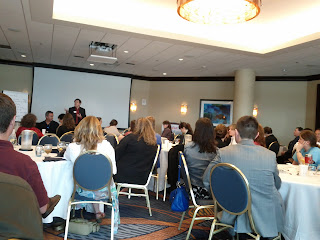 |
| Miami... Can't complain about the conference location, especially in December! |
Last week, Gabby Bradt from NH Sea Grant and I joined 77 marine debris experts from around the world to look at marine debris from an animal welfare perspective, during the World Society for Protection of Animals (WSPA)'s Untangled Symposium in Miami, FL.
As with many threats facing whales and other marine life, marine debris isn't the most uplifting problem to think about. It is an issue for marine life, who may ingest or become entangled in marine debris such as plastic bags and lost fishing gear. It is also a very complicated issue, as the creation, prevention and mitigation of marine debris involves so many stakeholders, including all of us, as we all make choices about what we eat, buy and dispose of. Solutions often need to take into account all these stakeholders, including industry, non-profit organizations and local, state and federal agencies.
 |
| Symposium Attendees |
The first day was spent giving presentations about our marine debris initiatives. Gabby and I presented information about our Isles of Shoals cleanups this summer, using them to talk about the legal challenges involved in removing fishing gear from the environment, and protection of seabirds such as terns and gulls.
 |
| Gabby Bradt discusses cleanups in seabird sanctuaries at the Isles of Shoals |
We learned that challenges we face here occur all over the world - cleaning up marine debris involves a lot of planning, coordination, and multiple organizations/agencies in many cases, and sometimes it seems to be a never-ending problem. But we were inspired by the fact that so many great organizations are working to prevent and clean up marine debris, and know that our cumulative impacts worldwide are making a difference. We are looking forward to the follow-up report from WSPA, and hope to share that with you in the future.
What can you do?
- Here are some ways you can prevent marine debris:
- Always dispose of your trash responsibly
- Pick up litter when you're at the beach or on a walk.
- Buy items with less packaging to reduce waste
- Repurpose, reuse and recycle when you can
- Never release a balloon outside
- Use reusable bags, bottles and mugs instead of disposables
Have other ideas? Share them on our Facebook page, or by email to info(at)blueoceansociety.org.
 |
| A room full of engaged marine debris experts |